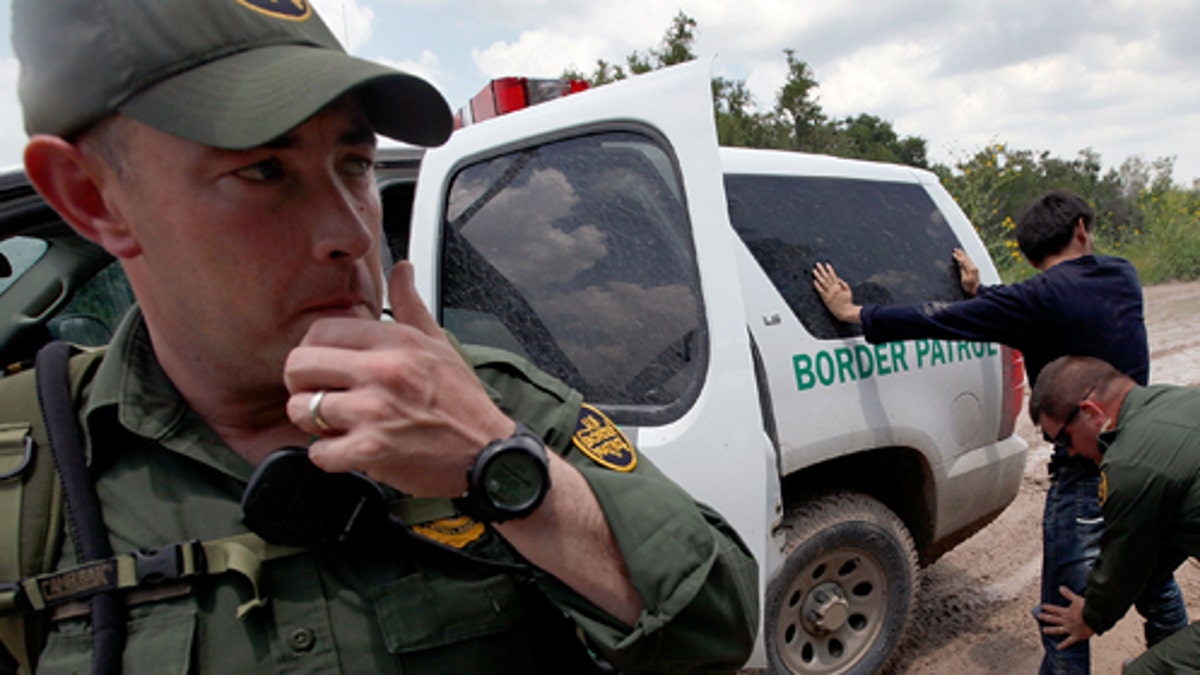
MCALLEN, TX - MAY 27: A Border Patrol agent searches an undocumented immigrant apprehended near the Mexican border on May 27, 2010 near McAllen, Texas. The man was captured with several other immigrants including two young children in thick brush after crossing the Rio Grande River. (Photo by Scott Olson/Getty Images) (2010 Getty Images)
With killings by U.S. Customs and Border Protection (CBP) agents on the rise, the American Civil Liberties (ACLU) presented testimony to the United Nations Thursday on human rights violations along the U.S.-Mexico border.
The ACLU presentation comes a week after a top UN human rights official said that the U.S. has used excessive force in dealing with immigrants along the border and needs to properly investigate the recent string of killings.
Since January of 2010, 20 individuals have either died or been seriously injured by CDP officials, including eight cases where agents responded to rocks being thrown across the border and six cases involving individuals killed while standing on the Mexican side of the border, the ACLU stated.
“They feel empowered to shoot people standing on the Mexican side of the border,” Vicki B. Gaubeca, the director of the ACLU New Mexico’s Regional Center for Border Rights told Fox News Latino of the CBP. “Imagine what would have happened if this occurred on the U.S.-Canada border.”
U.S. investigators announced last week that they were reviewing the U.S. Border Patrol's lethal force policies in the wake of the recent shootings. The Department of Homeland Security's Office of Inspector General probe involves a review of accusations of excessive force, the Associated Press reported, and CBP says it will cooperate with all investigations.
Rock throwing is considered deadly force, and Border Patrol agents generally find it acceptable to respond to the rock throwing with fatal weapons -- though critics claim it's an uneven fight and over the top.
"CBP law enforcement personnel are trained to use deadly force in circumstances that pose a threat to their lives, the lives of their fellow law enforcement partners and innocent third parties," said Michael Friel, a spokesperson for CBP. "We do not tolerate corruption or abuse within our ranks, and we fully cooperate with investigations of alleged misconduct by our personnel, on or off duty."
Kent Lundgren, a former agent and now chairman of the National Association of Former, told The Associated Press that rocks can be deadly.
"A rock thrown real slow will kill you just as dead as a bullet," Lundgren said.
He said in the early 1970s when he was hit in the head with a rock while patrolling the El Paso, Texas border.
"It put me on my knees," he said. "Had that rock caught me in the temple, it would have been lethal, I have no doubt."
The Mexican government has been vocal in their criticism of killings along the border by U.S. agents, with Mexico’s Senate urging President Felipe Calderón in September to pressure the U.S. to arrest and extradite a border agent involved in the fatal shooting of a Mexican on the border with Texas.
They feel empowered to shoot people standing on the Mexican side of the border.
According to a number of media accounts, the Mexican man - Guillermo Arevalo Pedraza - was killed after rocks were thrown at agents across the border. The Mexican Senate wants Calderón to start a joint investigation with U.S. authorities over the incident, in order to make an arrest "with the aim of extraditing the agent responsible,” according to Reuters.
Besides the killings along the border, the ACLU testimony will also touch on other alleged abuses such as unwarranted and invasive personal searches, unjustified and repeated detention based on misidentification, the use of coercion to force individuals to surrender their legal rights and sexual abuse.
“We are deeply concerned by these systematic abuses,” said Jennifer Turner, ACLU human rights researcher. “It is essential that the United States launch a comprehensive external investigation in addition to the Department of Homeland Security’s internal review. These reviews must examine CBP’s policies and practices in order to bring the United States in compliance with its human rights obligations to conduct thorough, impartial and transparent investigations and hold perpetrators accountable for human rights abuses.”
The ACLU’s San Diego office noted the case of Hernán Cuevas, a Chilean businessman who was attempting to enter the U.S. with a valid visa. Cuevas was allegedly strip-searched and detained for over three hours, without explanation.
“I could not believe I was in U.S. I was completely perplexed”, said Cuevas told the ACLU. “The incident was so bizarre that it was a perfect fit for a ‘banana republic,’ a corrupt place without democracy.”
The ACLU is urging the U.S. government to adopt a zero-tolerance policy for abuses and conduct publicly-released investigations as well as reform its use-of-force training and establish a permanent external, independent oversight commission to investigate complainants of CBP abuses along with other reforms.
“There needs to be transparent investigations,” Gaubeca said.
Illegal immigration and the flow of drugs across the border have put border agents on heightened alert. The administration of U.S. President Barack Obama has worked closely with Calderón to curb the flow of drugs across the two nations’ porous almost 2,000-mile joint border.
Despite some gains against Mexico’s major drug organizations, violence still continues to proliferate along Mexico’s side of the border as well as in other parts of the country and much of the violence is fueled by weapons coming across from the U.S.
